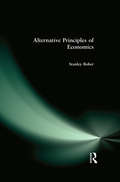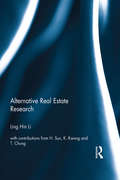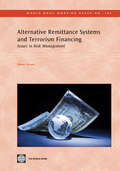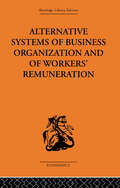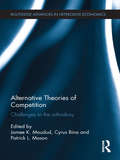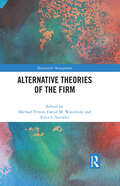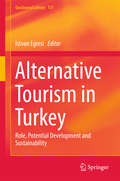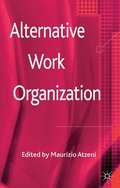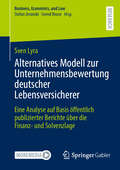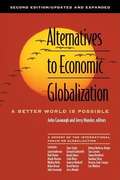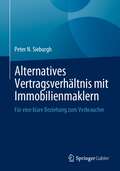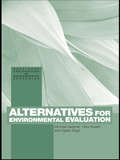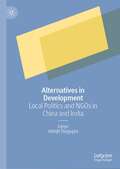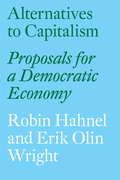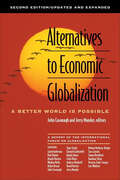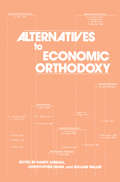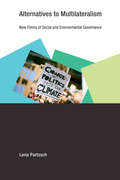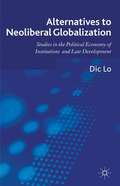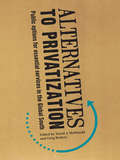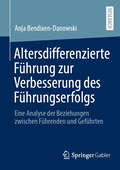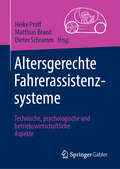- Table View
- List View
Alternative Principles of Economics
by Stanley BoberThis is the first book to provide a complete introduction to Post-Keynesian and other alternative theories of economics. Concise yet comprehensive, and written to be accessible to a wide audience, it offers a unique opportunity to enhance traditional neo-classical economics training with authoritative coverage of the full range of the non-orthodox paradigm.
Alternative Real Estate Research
by Ling Hin LiThis book aims to provide insight into the "soft" side of real estate research and the interesting results and implications of the real estate research outside the traditional realm of investment/financial aspects. The book also attempts to answer what constitutes the so-called "soft-side" of real estate research if we shift our focus from the usual financial returns and investment analysis. It also attempts to address whether there is such thing as an alternative real estate research paradigm. The book also argues that research in real estate should not only be limited to land and property market performance analyses as this may greatly impair the potential research implications of various real estate studies. The book argues that such analyses take on a very myopic view of real estate research. This book will interest many who wish to learn more about the alternative aspect of real estate research which is more than just about investment analysis.
Alternative Remittance Systems and Terrorism Financing: Issues in Risk Mitigation
by Matteo VaccaniGovernments, through their regulatory bodies, typically regulate formal financial sector players such as banks, which can leave providers working in informal remittance systems outside regulatory channels. Value transfer services-financial transfers performed domestically or across borders on behalf of clients-are essential to the financial system, and as such, are often offered by both formal and informal actors. Law enforcement and counter-terrorism authorities are evaluating money and value transmission channels for vulnerabilities that may make these channels attractive for illicit use, including the financing of terrorism. 'Alternative Remittance Systems and Terrorism Financing: Issues in Risk Management' aims to help countries bring these informal alternative remittance systems into their counter-terrorism programs, without hindering the ability of those who depend on these systems to send and receive money at low cost.
Alternative Systems of Business Organization and of Workers' Renumeration
by J.E. MeadeExamining the relationship between employment and rates of pay, this book discusses how the choice between different forms of business organization may affect this relationship. For the purposes of the discussion a simple model of an imperfectly competitive economy is constructed and then examined in operation with different organizational forms for the competing firms. Chapters cover the following:The Captialist Wage Economy; The Non-Discriminating Labour Co-operative; The Capitalist Sharing Economy; Discriminating Labour-Capital Partnerships.
Alternative Theories of Competition: Challenges to the Orthodoxy (Routledge Advances In Heterodox Economics Ser. #14)
by Cyrus Bina Jamee K. Moudud Patrick L. MasonThe history of policymaking has been dominated by two rival assumptions about markets. Those who have advocated Keynesian-type policies have generally based their arguments on the claim that markets are imperfectly competitive. On the other hand laissez faire advocates have argued the opposite by claiming that in fact free market policies will eliminate "market imperfections" and reinvigorate perfect competition. The goal of this book is to enter into this important debate by raising critical questions about the nature of market competition. Drawing on the insights of the classical political economists, Schumpeter, Hayek, the Oxford Economists’ Research Group (OERG) and others, the authors in this book challenge this perfect versus imperfect competition dichotomy in both theoretical and empirical terms. There are important differences between the theoretical perspectives of several authors in the broad alternative theoretical tradition defined by this book; nevertheless, a unifying theme throughout this volume is that competition is conceptualized as a dynamic disequilibrium process rather than the static equilibrium state of conventional theory. For almost all the others the growth of firm is consistent with a heightened degree of competitiveness, as both Marx and Schumpeter emphasized, and not a lowered one as in the conventional 'monopoly capital' view.
Alternative Theories of the Firm (Humanistic Management)
by Michael PirsonThe Theory of the Firm is commonly viewed as axiomatic by business school academicians. Considerations spanning organizational structures, their boundaries and roles, as well as business strategies all relate to the theory of the firm. The dominant theory of the firm poses that markets act perfectly to maximize the well-being of society when people act to maximize the personal utility of their individual purchases and firms act to maximize financial returns to their owners. However, burgeoning evidence and discourse across the scientific and policy communities suggests that the economic, social, and environmental consequences of accepting and applying this theory in the organization of business and society threatens the survival of the human species, among countless others. This book provides the latest thinking on alternatives to the theory of the firm as cornerstone of managerial decision making. Authors explore and elucidate theories that help us understand a firm differently and suggest alternatives to the theory of the firm. This book will be of value to researchers, academics, practitioners, and students interested in leadership, strategic management, and the intersection of corporate interests and the wellbeing of society.
Alternative Tourism in Turkey: Role, Potential Development and Sustainability (GeoJournal Library #121)
by Istvan EgresiThis book takes inventory of and evaluates the available resources for the development of alternative tourism in Turkey. It examines the role of alternative tourism in future tourism development plans and proposes public policies necessary to assure sustainability. Although tourism started later in Turkey than in the Western Mediterranean countries it has grown very rapidly during the last three decades and today the country ranks among the top ten countries in the world in terms of both arrivals and receipts. However, most of the tourism development has been in the mass tourism sector or the so-called sun-sea-sand tourism. While crucial for the economic development of Turkey, mass tourism, in the absence of proper planning, has happened in a haphazard manner leading to numerous environmental and socio-cultural problems. This book argues that, in order to mitigate these problems, Turkey should encourage the development of alternative forms of tourism.
Alternative Work Organizations
by Maurizio AtzeniCurrent and historical examples in the labour movement worldwide have helped to debunk the myth that workers cannot run production. Workers can take control of factories, reverting many assumptions about property, management, work organisation, wages andchallenge the almost natural character of capitalist work relations. This volume uses geographically and historically diverse examples to analyse the challenges and questions that alternative forms of work present to those involved.
Alternatives Modell zur Unternehmensbewertung deutscher Lebensversicherer: Eine Analyse auf Basis öffentlich publizierter Berichte über die Finanz- und Solvenzlage (Business, Economics, and Law)
by Sven LyraSven Lyra untersucht ein aktuelles Problem der betriebswirtschaftlichen Forschung und Praxis: die alternative Modellierung der Bewertung von Unternehmen der Versicherungswirtschaft. Ziel seiner Arbeit ist es, ein möglichst allgemeingültiges und gewichtetes Bewertungsmodell für deutsche Lebensversicherer zu entwickeln, das sowohl quantitative als auch qualitative Kriterien und Kennzahlen berücksichtigt. Durch eine systematische Auswertung von quantitativen Kennzahlen und qualitativen Texten mit Hilfe des Generative Pre-Trained Transformers 4 analysiert er die Berichte zur Finanz- und Solvabilitätssituation der Unternehmen. Auf Basis dieser Analysen wird ein alternatives, ganzheitliches und modulares Ratingmodell entwickelt. Dieses Modell wird durch statistische Analysen validiert und mündet in eine praxisnahe Handlungsempfehlung für deutsche Lebensversicherer.
Alternatives To Economic Globalization
by The Editors of the International Forum on Globalizationargues that the current model of economy is both unjust and unsustainable and presents alternatives
Alternatives Vertragsverhältnis mit Immobilienmaklern: Für eine klare Beziehung zum Verbraucher
by Peter N. SieburghIn diesem Buch wird die Regelung des BGB über die Leistungen von Makern auf Immobilientransaktionen angewandt, wobei eine der Parteien ein Verbraucher ist. Dabei wird die Frage beantwort, wie adäquat diese Regelung heute noch ist. Die Antworte ergibt sich aus der langjährigen politischen und gesellschaftlichen Diskussion über die Leistungen der Immobilienmakler auf dem Wohnungsmarkt und den daraus resultierenden Gesetzentwürfen und Gesetzesänderungen. Es wird nachgewiesen, dass das Nachweisen/Vermitteln laut § 652 BGB ff. nicht mehr die geeignete Grundlage für Makler ist, um Immobiliengeschäfte mit Verbrauchern abzuschließen.
Alternatives for Environmental Valuation (Routledge Explorations in Environmental Economics #Vol. 4)
by Michael Getzner Clive Spash Sigrid StaglMethods for raising awareness of how human’s value the environment range from monetary valuation through to greater public participation in decisions. In this book a group of international experts explore innovative alternatives which are critically evaluated and compared. Lessons are drawn from both the successes and failures of different approaches. Case studies address a wide variety of cutting edge environmental problems from agro-forestry and wetlands to climate change, biodiversity and genetically modified organisms.
Alternatives in Development: Local Politics and NGOs in China and India
by Abhijit Dasgupta LiyiyuThis book deals with the dynamics of local-level politics in China and India. China introduced new policies to restructure local politics in 1978. In place of communes, civil society organizations and cooperatives were introduced in villages. More changes came about with the introduction of the Organic Law of the Villagers' Committees of the People's Republic of China in 1998. The new local power structure includes state-sponsored institutions like Villagers Committees and the traditional civil society organizations (CSOs) and non-government organizations (NGOs). As in China, local politics in India undergoes considerable changes during the last few decades. Panchayati Raj Institutions (PRIs) were reformed in 1992 with a constitutional amendment act. CSOs and NGOs were allowed to function. Against this background, the present book is undertaken with the objectives first, to present two different models of local politics and second, to compare the two, finally to focus on the two different models of development. This book will interest scholars of rural governance, rural transformation, and the role of the grassroots CSOs and NGOs in shaping development program and growth in the two large countries in Asia.
Alternatives to Capitalism: Proposals for a Democratic Economy
by Erik Olin Wright Robin HahnelWhat would a viable free and democratic society look like? Poverty, exploitation, instability, hierarchy, subordination, environmental exhaustion, radical inequalities of wealth and power--it is not difficult to list capitalism's myriad injustices. But is there a preferable and workable alternative? Alternatives to Capitalism: Proposals for a Democratic Economy presents a debate between two such possibilities: Robin Hahnel's "participatory economics" and Erik Olin Wright's "real utopian" socialism. It is a detailed and rewarding discussion that illuminates a range of issues and dilemmas of crucial importance to any serious effort to build a better world.From the Trade Paperback edition.
Alternatives to Economic Globalization: A Better World Is Possible
by John Cavanagh Jerry MandersWritten by a premier group of 21 thinkers from around the world, the second edition of Alternatives to Economic Globalization lays out democratic, ecologically sound, socially just alternatives to corporate globalization more fully, specifically, and thoughtfully than has ever been done before. Focusing on constructive, achievable goals, the authors present ten governing principles for establishing truly sustainable societies and describe alternatives to the World Bank, the IMF, and the WTO that would better serve the needs of the planet. They offer detailed proposals for protecting vital goods and services from corporate exploitation, limiting corporate privileges and power, rebuilding economies to make them more responsive to human needs, and more. This revised and expanded edition features a new opening chapter on the global balance of power, a new section on the media and globalization, and a new final chapter on what ordinary citizens can do to fight the injustices of globalization. It also includes many new charts, sidebars, and other updated information.
Alternatives to Economic Orthodoxy: Reader in Political Economy
by Randy AlbeldaExploring the question of whether China's peasantry was a revolutionary force, this volume pays particular attention to the first half of the 20th century, when peasant-based conflict was central to nationwide revolutionary processes. It traces key themes of social conflict and peasant resistance.
Alternatives to Multilateralism: New Forms of Social and Environmental Governance (Earth System Governance)
by Lena PartzschAnalysis and case studies of emerging forms of private, public, and hybrid social and environmental governance.The effects of globalization on governance are complex and uncertain. As markets integrate, governments have become increasingly hesitant to enforce regulations inside their own jurisdictions. At the same time, multilateralism has proven unsuccessful in coordinating states' responses to global challenges. In this book, Lena Partzsch describes alternatives to multilateralism, offering analyses and case studies of emerging--alternative--forms of private, public, and hybrid social and environmental regulation. In doing so, she offers a unique overview of cutting-edge approaches to global governance.
Alternatives to Neoliberal Globalization
by Dic LoThrough a compliance with the neoliberal doctrines associated with the Washington Consensus, and the corresponding emphasis on the privitization of public assets, the promotion of well-defined property rights and a focus on price and trade liberalisation, developing countries have been promised that 'natural economic institutions' will form. However, despite the promotion of these doctrines, the 1980s and 1990s have come to be known as the 'lost decades of development': a period of long economic stagnation in most parts of the developing world, with little sign of the income level of the developing world converging with that of developed countries. In this book, Dic Lo re-examines the mainstream policy doctrines of globalization, and formulates explanations for the uneven development of recent years. Through a comparative analysis of the actual experiences of developing nations and their policy positions, this book clarifies the positive and negative lessons that can be learned by developing countries. Dic Lo also undertakes an examination of the theoretical underpinnings of the competing doctrines of institutions and development, with a view to creating a synthesis that transcends neoliberalism, instead emphasising solidarity and humanistic development.
Alternatives to Privatization: Public Options for Essential Services in the Global South (Routledge Studies in Development and Society)
by Greg Ruiters David A. McDonaldThere is a vast literature for and against privatizing public services. Those who are against privatization are often confronted with the objection that they present no alternative. This book takes up that challenge by establishing theoretical models for what does (and does not) constitute an alternative to privatization, and what might make them ‘successful’, backed up by a comprehensive set of empirical data on public services initiatives in over 40 countries. This is the first such global survey of its kind, providing a rigorous and robust platform for evaluating different alternatives and allowing for comparisons across regions and sectors. The book helps to conceptualize and evaluate what has become an important and widespread movement for better public services in the global South. The contributors explore historical, existing and proposed non-commercialized alternatives for primary health, water/sanitation and electricity. The objectives of the research have been to develop conceptual and methodological frameworks for identifying and analyzing alternatives to privatization, and testing these models against actually existing alternatives on the ground in Asia, Africa and Latin America. Information of this type is urgently required for practitioners and analysts, both of whom are seeking reliable knowledge on what kind of public models work, how transferable they are from one place to another and what their main strengths and weaknesses are.
Alternatives to the Central Bank in the Developing World
by Charles CollynsA national central bank is usually high on the shopping list of a newly independent country. Such a country often inherits a currency board—a carryover from the colonial era—and wishes to establish a new monetary authority with far wider executive powers and public responsibilities.
Alternatives: How to Make Smarter Choices by Creating Better Alternatives to Choose From
by John S. Hammond Ralph L. Keeney Howard RaiffaAlternatives are the raw material of decision making. This chapter looks at an important element of effective decision making: creating imaginative alternatives or different courses of action you have to choose from.
Alternatives: The Source of Superior Solutions
by Richard LueckeTo make an informed decision, you must be able to look at alternative solutions and weigh the merits of those alternatives. This chapter explains how to generate other possibilities, brainstorm effectively, and combine features to create a hybrid alternative.
Altersdifferenzierte Führung zur Verbesserung des Führungserfolgs: Eine Analyse der Beziehungen zwischen Führenden und Geführten
by Anja Bendixen-DanowskiIn dieser Studie erfolgte erstmals im Rahmen der altersdifferenzierten Führungsforschung eine Analyse der Beziehungen zwischen Führenden und Geführten eines Unternehmens. Der dreistufige Mixed-Method-Ansatz umfasst qualitative Expertise-Interviews (N = 30), welche die Grundlage für eine Online-Befragung der Mitarbeitenden (N = 249, 68 %) einer digitalaffinen Firma bildeten. Im anschließend virtuell durchgeführten zweitägigen Führungskräfteworkshop (N = 30) wurden Handlungsempfehlungen abgeleitet. Diese zielten darauf ab, die Ansprüche von Berufseinsteigenden zu berücksichtigen, die Interesse an beruflicher Weiterentwicklung und abwechslungsreichen Arbeitsaufgaben zeigten. Zusammenfassend lässt sich konstatieren, dass die Bewältigung der Distanz, die durch das zweijährige Homeoffice während der COVID-19-Pandemie entstanden ist, eine anspruchsvolle Führungsaufgabe darstellt. Das Ziel der hier angestoßenen Organisationsentwicklung besteht in der langfristigen Steigerung der Arbeitszufriedenheit und Leistungsbereitschaft. Die abgeleiteten praktischen Implikationen empfehlen sich für einen Praxistransfer.
Altersgerechte Fahrerassistenzsysteme: Technische, psychologische und betriebswirtschaftliche Aspekte
by Dieter Schramm Heike Proff Matthias BrandMenschen in hoch entwickelten Ländern werden immer älter. Sie möchten im Alter mobil sein, haben jedoch oftmals Probleme im Straßenverkehr. Auch wenn sie häufig für altersgerechte Produkte, die die Sicherheit erhöhen, einen Aufpreis bezahlen, ist die Nachfrage nach Fahrerassistenzsystemen bei älteren Autofahrern bislang gering. Das Buch fasst Ergebnisse des Projektes ALFASY (ALtersgerechte FAhrerassistenzSYsteme) zusammen, in dem ein akustisches Fahrerassistenzsystem für die Bedürfnisse der stetig wachsenden Gruppe der älteren Fahrerinnen und Fahrer (50 Jahre und älter) entwickelt und aufgebaut wird. Untersucht wurden technische, psychologische und betriebswirtschaftliche Aspekte.
Altersvorsorge am Scheideweg: Erfolgreiche Strategien gegen Altersarmut
by Heinz Benölken Nils BröhlAnbieter und ihre Vertriebspartner können durch gute „ganzheitliche“ Beratung an der Altersvorsorge ihrer Kunden dann verdienen, wenn sie sich in deren Bedarfssituation versetzen und Produkte in der richtigen Reihenfolge anbieten, bei denen Kunden inklusive staatlicher Förderung eine faire Nettoverzinsung erzielen. Damit kommen die Autoren zu einem wichtigen Punkt: Altersvorsorge ist Absicherung fürs Alter und nicht mit Spekulation zu verwechseln. Verluste führen hier nicht nur zur Katerstimmung am Morgen danach, sondern können der Einstieg in Altersarmut sein. Altersvorsorgesparen ist ein Sparvorgang mit dem Ziel, den Endwert des Sparvermögens zu maximieren. Dazu braucht der Bürger eine hohe Transparenz im Altersvorsorge-Dschungel von Riester-, Rürup- und bAV-Produkten sowie weiteren Anlagen, durch die der Leser dieses Buches geführt wird.
